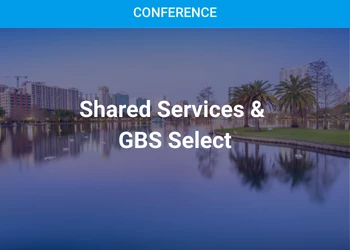2012: Digital Initiatives
Add bookmarkInterview with Sam Austrin-Miner – by Barbara Hodge, Editor, SSON
In the run up to Shared Services & Outsourcing Week 2012, April 16-19 2012, Melbourne, Australia, we are cornering some of our keynote speakers to get their perspective on the marketplace.
Barbara Hodge: Sam, why don’t you outline your shared services work and talk a little about changes you see ahead?
SA-M: The work that we focus on is principally in local government. It’s around helping, in particular, regional Australian local governments reorganise themselves and prepare for what’s known as "Destination 2036", which alludes to the need to simplify, standardise and prepare to share all local government practice. That need and response in Local Government is amplified greatly by the introduction of the National Broadband Network in all those councils.
Sam let’s delve a little bit deeper into the National Broadband Network, what is this?
The National Broadband Network is the delivery of brand new, super fast, super highway broadband infrastructure by federal government across the whole of Australia. The government is in the process of delivering the first eight cities across Australia, but then I think it will roll out to over 40. Basically, it’s infrastructure for very fast internet access.
And this is going to basically reinvent what local government can do?
That’s right. The government has a number of other initiatives that run along with that known as the digital initiatives -- so that’s in health, education, local government, etc. So they’re investing huge amounts of money in helping local governments and organisations reorganise themselves, to put more of their services online and prepare for the digital economy.
The labour market in Australia, like everywhere else around the world, has obviously taken a big hit in the last couple of years. What do you think the shared services industry could do for regional stimulation?
The shared services industry, I think, is the answer to what you might call a job question that’s coming, for Australia. It’s not quite here yet, as we’re a bit buffered from the rest of the global financial crisis. But what it will do, when it comes, is stimulate diversification in rural Australia. Organisations preparing to share through simplification and standardisation in Australia can now create regional diversification through the introduction of things like contact call centres, transactional processing centres, business incubation centres, green data centres etc; that actually will, if conducted appropriately, not just sustain current jobs but potentially grow them by moving transactions and finance from large metro-political capitals in Australia into regional Australia. So it’s a real diversification model that will provide real jobs, and sustainability for current jobs.
And do you think that we’ll see the emergence of a brand new type of job which some regions are not yet "skilled" enough for?
Absolutely. Traditionally, the regional areas tend to be rural, so the economies are built up on rural practices -- agriculture and associated industries. So you can get real diversification by introducing the right kinds of technologies. And NBN allows us to do that. It allows us to attract other businesses and large corporates that may want to invest into those regions for competitive and diversification reasons. For example, the price of real estate in regional Australia is a fraction of what it costs in large metro-political capitals. But also companies may choose, or people my choose, to have a different kind of lifestyle -- what’s known as the "tree change" in Australia, by moving out of those cities into the rural areas.
Do you think that perhaps there’ll be a skills gap emerging?
I think there will. I don’t think it’s gap, as such, but it’s diversification so it’s a different set of skills. Transition from one set to the other isn’t too complex. For example it provides the opportunity to retain jobs in Australia. The more the government sector -- or even the commercial sector -- looks at outsourcing overseas, particularly for things like call centres, the more we ought to look at doing that in regional Australia. That skills gap can be resolved through retraining and redeploying appropriately and quickly. There’s a labour force in regional Australia that’s keen to do that. Also, Australians want to keep jobs in Australia, right? It makes no sense to outsource them overseas if we can retain them here at the right rates, with the right kind of skill sets.
You’re also speaking on benefits realisation at the conference. What are the main problems that you run into across industries?
The classic problem is that people move very swiftly from a business case that’s been approved at a high level, to deployment of the findings of that business case, without recognising the need to actually focus on benefit realisation. What tends to happen is people start deploying projects and the delivery quickly becomes about process adaptation, or about implementing a new system, or a new organisation with new branding, and so on. That’s obviously all part of the delivery. But the focus shifts to that, rather than why we wanted to do it in the first place, which, of course, was to achieve specified certain benefits. So the process of delivery, the actual project delivery, undermines benefit realisation because it sees its core as delivering a number of changes, and systems, and processes, rather than the benefits. "It’s like going shopping in Manhattan and leaving your wallet behind, you can say you went shopping in Manhattan, but you have nothing to show from it, except sore feet!"
What happens is people get to the end of their delivery, and they say, "Well, we delivered!" And then someone else will come along and say, "Well, where are the benefits please?" And they’ll say, "Well, we need to create another project to deliver those." Etc. There’s usually too much optimism bias inside the original business case. People are keen and often the same people delivering the project are those creating the business case. They don’t necessarily have the experience of benefit realisation. So to remedy that we’ve created a process that actually redirects project delivery processes towards benefits realisation.
At this year’s Shared Services & Outsourcing Week in Australia 65% of our audience confirmed that they weren’t on track in reaching the benefits they were hoping for. One of the problems may be that benefits aren’t adequately defined. How would you classify them?
Classification of benefits is another area that we all fall down on, and that’s because people tend to view classification very simplistically. So they’ll have things in the business case that look good but describe them poorly. I’ve seen business cases assert that they’ll save over £100 million, for example, and they’ll describe the benefits as ‘hard’ or ‘soft’, or ‘tangible’ or ‘intangible’, or in sometimes in terms like ‘cash’ or ‘non-cash’.
Now that makes sense at a basic level, but actually even within financial benefits – what we might call hard benefits or cash benefits – there are actually a number of different types of benefits: ones that should be described more realistically in terms of how easily they can be realised, say ‘logical’ financial benefits; ones that you can realise as say ‘definite’ financial benefits. If you start to analyse those appropriately, you find that you get a more realistic risk managed approach to benefit realisation. So adequate classification is absolutely fundamental to adequate realisation.
Well, I’m not going to ask you what the remedy is, Sam, we’ll have to keep that for the conference. But thank you so much for your time today. It’s been a pleasure speaking to you.
[eventpdf]





















